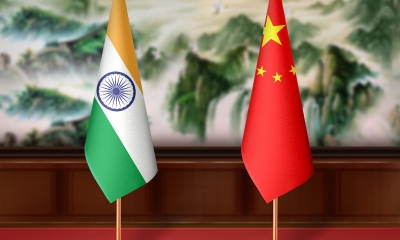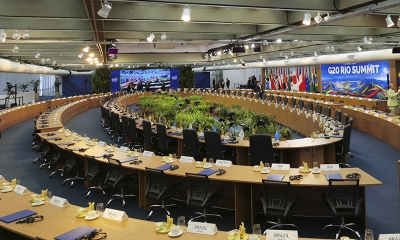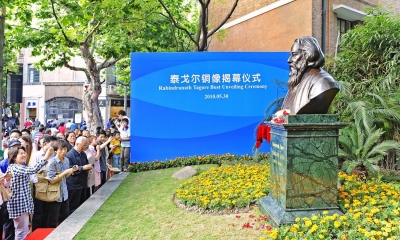Enhancing BRICS Solidarity and Building a Better Post-COVID World

The Delhi Declaration reiterated BRICS countries’ support for multilateralism, saying they are committed to promoting the building of a community with a shared future for mankind.
The emerging-market bloc of BRICS, namely Brazil, Russia, India, China and South Africa, concluded their 13th Annual Summit on September 9, 2021, under the theme of “BRICS@15: Intra-BRICS cooperation for continuity, consolidation and consensus” after issuing the New Delhi joint declaration which is nothing short of remarkable.
This year, India hosted the BRICS summit in a virtual format due to the COVID-19 pandemic in its capacity as chair of the influential bloc for the third time after hosting in 2012 and 2016. At the invitation of Prime Minister Narendra Modi, Chinese President Xi Jinping, Brazilian President Jair Bolsanaro, South African President Cyril Ramaphosa and Russian President Vladimir Putin attended the meeting via video link.
During the second virtual conclave since the last summit at Moscow, the BRICS leaders stressed their resolution to counter Western hegemony led by the U.S. by using their growing economic and political influence while setting directions and cooperation for a stronger BRICS that can play a larger role in global governance, economic development in the post-COVID world, security issues, and settling Afghan situation via peaceful means.
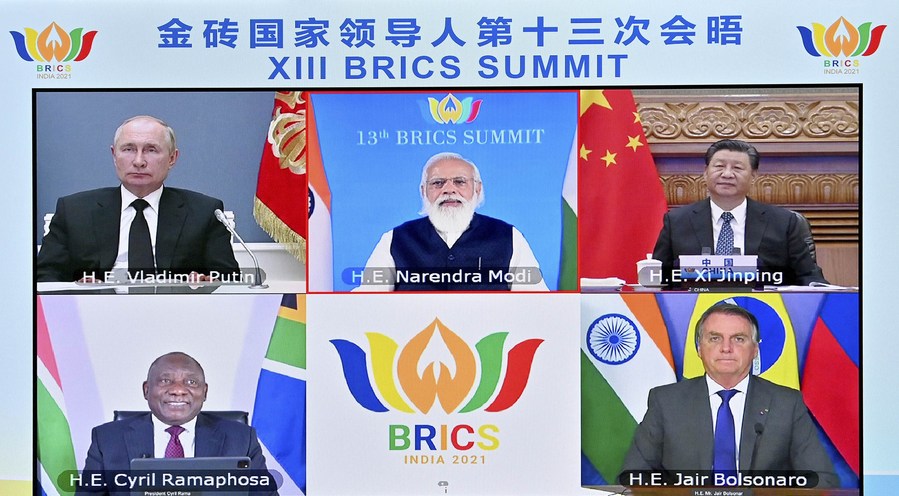
BRICS – a force to reckon with on global stage
The BRICS countries have witnessed the continued improvement of their cooperation mechanism, expansion of collaboration areas, and enhanced global influence. Expressing pride in the achievements of the BRICS, PM Modi in his opening remarks said that the BRICS has witnessed several achievements in the past one-and-a-half decades and is an influential voice for emerging economies of the world. Referring to the theme, he asserted that the BRICS countries need to ensure that BRICS yields more results in the next 15 years.
Modi’s voice has also been echoed by President Xi who attended and delivered a keynote speech entitled “Advance BRICS Cooperation to Meet Common Challenges Together” at the BRICS summit for the ninth consecutive year. Focusing on enhancing cooperation among the BRICS members, he said, “The BRICS countries have become an important force on the international stage to be reckoned with.” Looking ahead on the common journey of development within and beyond the five BRICS countries, he called for deepening cooperation among the member states to build a closer and more results-oriented partnership to meet common challenges. In order to overcome the compounding challenges facing the global community, “We the BRICS countries must step forward to make an active contribution to world peace and development and advance the building of a community with a shared future for mankind,” Xi said.
The BRICS leaders in their respective speeches highlighted different issues of the times ranging from regional and global security to the disruption in economic growth caused by the pandemic, from the restoration of supply chain mechanism to Afghanistan developments and pledged to create a better future for mankind.
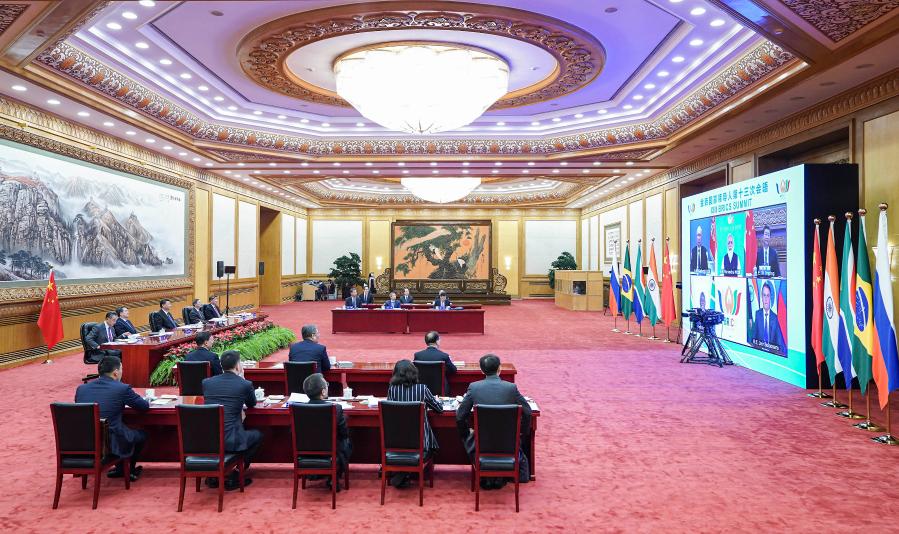
Enhancing BRICS cooperation
This year marks the 15th anniversary of the BRICS association. The BRICS countries are home to 42 percent of the world population, 24 percent of the global economy, 18 percent of global trade in goods, 13 percent of global trade in services and 25 percent of global foreign investment. BRICS countries have given importance to global growth as well as the role BRICS plays in the world economy.
The New Delhi Declaration reviewed the achievements made over the past 15 years, recalling development and multilateralism fostered by previous summits especially the fruitful progress of the New Development Bank (NDB) and the initiation of the BRICS Contingent Reserve Arrangement (CRA) that have ensured greater cooperation among BRICS countries.
The BRICS leaders praised the achievements of the BRICS Business Council and the New Development Bank (NDB). Officially opened in 2015, the Shanghai-headquartered NDB has approved about 80 projects for its member countries, totaling a portfolio of $30 billion and covering sectors from transport, water and sanitation, and clean energy to digital and social infrastructure and urban development. Since the outbreak of the COVID-19 pandemic has caused problems for businesses, as of November 2020, the NDB has allocated a total of $4 billion in loans to China, India, South Africa and Brazil for emergency expenditures on public health.
It is worth mentioning here that President Xi in his speech stressed the significance of the NDB and the BRICS Partnership on the New Industrial Revolution innovation center which was launched in the Chinese city of Xiamen in December last year. It should be noted here that at the center’s inauguration ceremony on September 7, 28 projects with a total investment of over 13.4 billion yuan (about $2.07 billion) were inked by BRICS enterprises. It can be hoped that the Xiamen innovation center will create more market, employment and business opportunities for the BRICS countries and other countries in the global south. “Despite COVID-19 situation this year, over 150 BRICS meetings and events were organized. Of these, over 20 were ministerial-level,” PM Modi said. This clearly indicates that BRICS countries have strengthened their collective voice on the global stage.
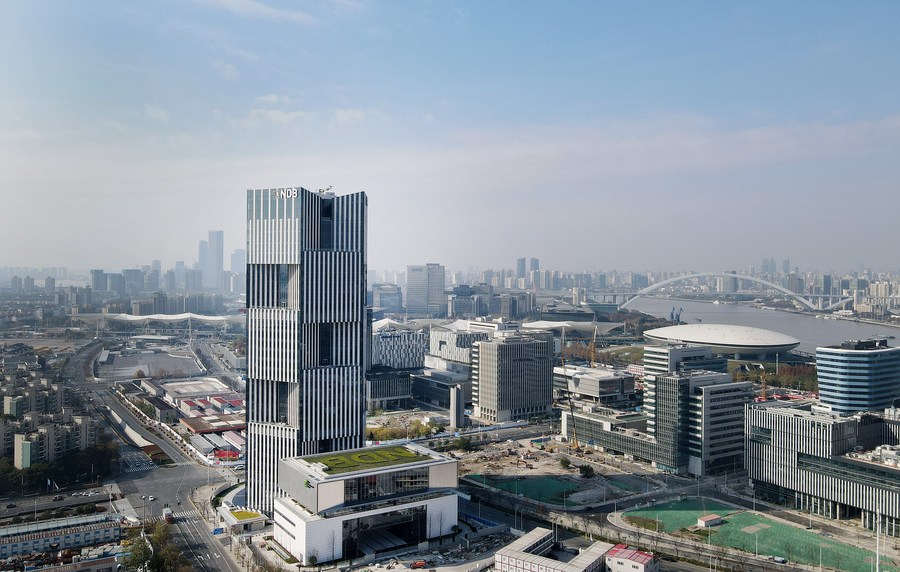
BRICS fights against global COVID-19 pandemic
Since the COVID-19 pandemic has been wreaking havoc around the world for almost two years, in the New Delhi Declaration, the BRICS leaders called for better international preparedness and enhanced cooperation to fight the pandemic and other current and future health challenges through the mobilization of political support and necessary financial resources. The BRICS emphasized that the international community has a collective responsibility to work together against the COVID-19 pandemic in the true spirit of partnership within existing international frameworks including the World Health Organization (WHO). In his speech, President Xi said that China has promised to provide two billion COVID-19 vaccine doses to the world throughout this year and offer $100 million to COVAX.
On tracing the origins of the pandemic, the BRICS countries voiced support for multilateralism and the leading role of the WHO. “We note that the cooperation on study of origins of SARS-COV-2 is an important aspect of the fight against the COVID-19 pandemic. We support science-based, inclusive of broad expertise, transparent, and timely processes, free from politicization or interference, to strengthen international capabilities to better understand the emergence of novel pathogens and to help prevent future pandemics,” the paragraph number 7 in the joint declaration reads.
The BRICS countries have been actively communicating and cooperating with each other since the early days of the pandemic, and have deep cooperation in the development of COVID-19 vaccines. It is heartening to see that despite having a bad time due to border conflicts, both China and India still help each other fight the pandemic. In June last year, the Beijing-based Asian Infrastructure Investment Bank offered India a loan of $750 million as special aid for the poor people in the country. Truly, BRICS members have maintained the momentum of BRICS cooperation overcoming the impact of COVID-19.

BRICS adopts counter-terrorism action plan
The five nations have adopted a counter-terrorism action plan and taken collective position on strengthening and reforming multilateral systems at the 13th BRICS summit. The BRICS leaders condemned “terrorism in all its forms and manifestations whenever, wherever and by whomsoever committed.”
Although PM Modi and President Xi did not make any reference to Afghanistan in their opening remarks, there is a strong reference to the Afghan issue in the New Delhi Declaration. The BRICS leaders called for “refraining from violence and settling the situation by peaceful means in Afghanistan”, through an “inclusive intra-Afghan dialogue” so as to ensure stability, civil peace, law and order in the country. Paragraph 23 of the declaration explicitly said, “We underscore the priority of fighting terrorism, including preventing attempts by terrorist organizations to use Afghan territory as a terrorist sanctuary and to carry out attacks against other countries, as well as drug trade within Afghanistan.” In the declaration, the leaders stressed that the fight against terrorism must be conducted in accordance with international law.
It should be noted here that on September 9, China extended an emergency aid of 200 million yuan ($31 million) to Afghanistan, including food supplies and coronavirus vaccines under the China-South Asian Countries Emergency Supplies Reserves.
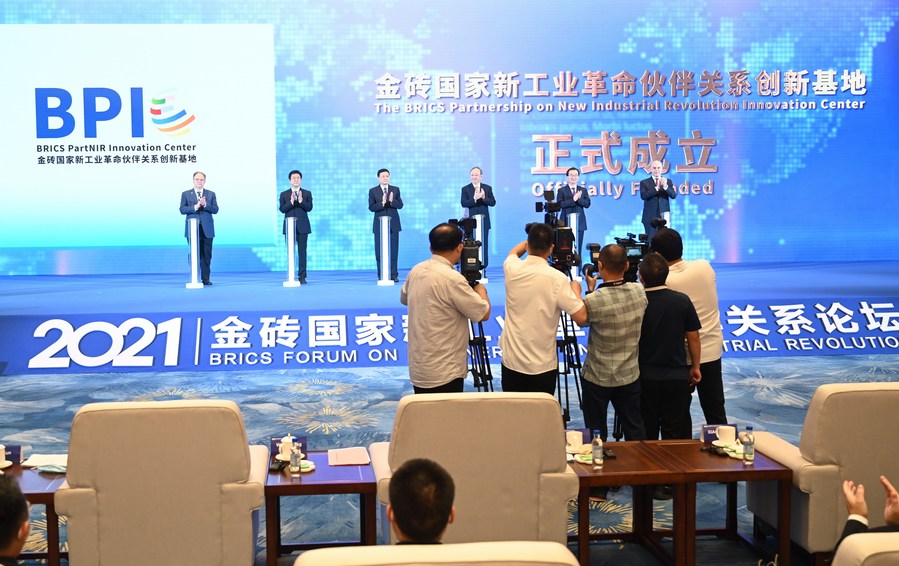
Multilateralism remains the heart of BRICS cooperation
Since the inception of BRICS, the organization has become a fine example of multilateralism opposing unilateralism, de-globalization and anti-globalism. Warning against “bloc politics” from the United States and the West, BRICS leaders reaffirmed that they remained committed to an open and inclusive world economy and firmly opposed protectionism. And in this context President Xi stressed BRICS countries should promote the practice of true multilateralism, adhere to the purposes and principles of the UN Charter, and safeguard the UN-centered international system and the international order underpinned by international law. Over the past few years, China has made unremitting efforts to strengthen the unity among BRICS countries and actively expand the “BRICS Plus” cooperation model, among other things.
It’s really encouraging that during the 13th BRICS summit, BRICS leaders, bound by their mutual interests, took the pledge to strengthen and reform the multilateral system through enhanced cooperation and close coordination in all relevant multilateral fora and international organizations including, the UN and G20. The Delhi Declaration reiterated BRICS countries’ support for multilateralism, saying they are committed to promoting the building of a community with a shared future for mankind.
Stronger partnership, brighter future
The 13th summit reached consensus on the international situation, global governance and cooperation among the five countries. Undoubtedly, this year’s summit deepens South-South cooperation. The virtual meeting actively demonstrated the “BRICS Plus” pattern and reaffirmed the BRICS spirit of openness, inclusiveness and win-win cooperation, and mapped out a new blueprint for strengthening BRICS partnership and deepening practical cooperation in various areas.
Next year, China will host the 14th summit of the BRICS. Let us hope the BRICS countries of the jaguar (Brazil), the bear (Russia), the elephant (India), the dragon (China) and the springbok (South Africa) will continue to work together as one voice in forging a stronger pragmatic partnership that is fair, open, and innovative to benefit the welfare of humankind.
 Facebook
Facebook
 Twitter
Twitter
 Linkedin
Linkedin
 Google +
Google +




